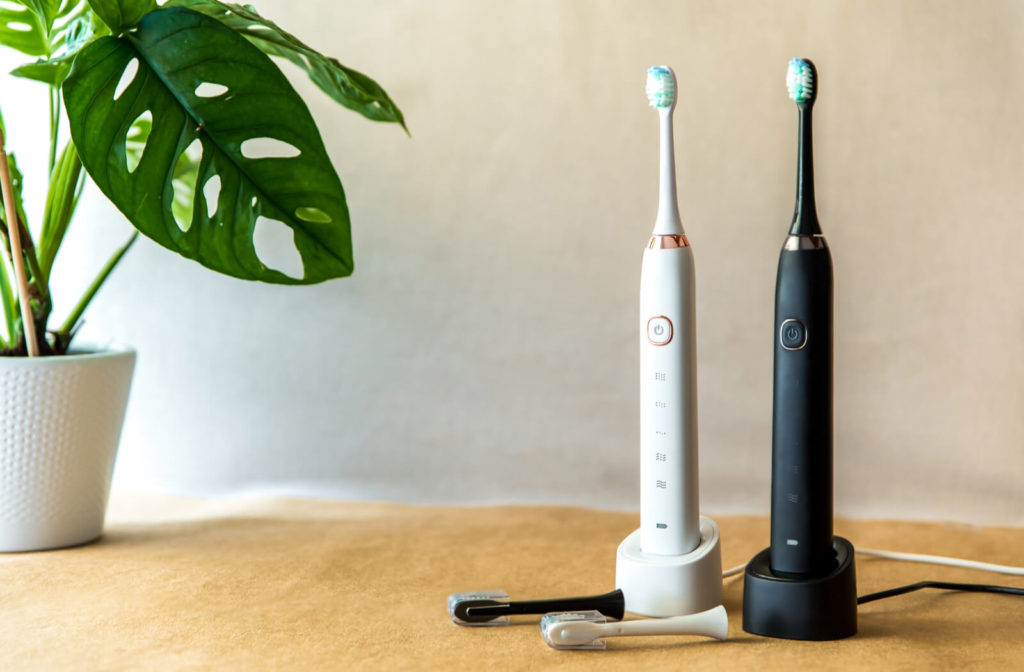Are Electric Toothbrushes Worth It?
Have you ever found yourself staring at what seems like countless options in the oral care aisle of your local store? Today, there are more choices in toothbrushes than ever before.
It’s true that brushing starts before you even have teeth. Before a baby’s first tooth emerges, brushing the gums with a wet cloth or finger brush is recommended to remove bacteria and familiarize with brushing.
Regular checkups with your dentist can help achieve optimum oral health. It also starts with brushing daily and professional cleaning every 6 months to keep the plaque at bay.
Still no closer to deciding which toothbrush to buy or if electric toothbrushes are worth it? Let’s find out.
What are Electric Toothbrushes?
Electric toothbrushes have become very popular, offering an alternative to traditional manual toothbrushes. Millions of people, close to 50%, own an electric toothbrush.
The electric toothbrush, invented by a Swiss dentist, Philippe-Guy Woog, in 1954, was intended for patients with braces and low limited motor skills. In 1959, the electric toothbrush went into mass production in the United States.
Types of Electric Toothbrushes
An electric toothbrush is a high-tech device with vibrating oscillation, rotation or pulsation to help clean the teeth. It can have several parts which can dismantle into smaller sections to allow for removal and cleaning.
Here are different electric toothbrushes based on the type of action they perform:
- Side-to-side vibration offers lateral side-to-side movement.
- Rotation oscillation has a brush head that rotates in one direction and then another.
- The circular brush head rotates in one direction.
- Ultrasonic offers bristles that vibrate at ultrasonic frequencies.
- Ionic brushes impart an electrical charge to disrupt plaque on the surface of teeth.
Benefits of an Electric Toothbrush
Electric brushes are commonly used over manual brushes because they use micro-movements and work by moving in different directions. Brushing twice a day helps remove plaque buildup.
Plaque, after all, causes cause gingivitis and other dental problems. If not removed, it hardens to form tartar. So much that 7 out of 10 Canadians will develop gum disease someday.
The benefits of using an electric toothbrush include:
Removes Plaque More Effectively
A study shows that an electric toothbrush removed more plaque than a manual toothbrush over 42 days. The effectiveness of an electric toothbrush is also a result of the oscillation, rotating movement, and interproximal bristles of the brush.
Allows for Brushing with Ease
One huge advantage is that, unlike manual brushes, the user does not need much muscle power or strength to use an electric toothbrush. Seniors, people with arthritis and limited mobility, and people with braces will have no problem maintaining excellent dental hygiene.
Electric toothbrushes are also most effective in removing plaque in disabled children. One study found that electric toothbrushes reduced 32.3% more plaque in children 3 to 6 years and 51.9% more plaque in children 7 to 9 years than a manual toothbrushes.
Electric Toothbrushes Come with a Timer
While manual toothbrushes work well to remove plaque, most people may not brush for the recommended 2 minutes. Most electric toothbrushes come with a timer and allow you to brush each tooth with thousands of strokes compared to less with a manual toothbrush.
An Electric Brush Head is Smaller
The shape and size of an electric brush head are smaller than a manual toothbrush and allow you to get to hard-to-reach areas alongside teeth and at the back of the mouth. Always read the instruction manual to ensure proper usage of your electric toothbrush to prevent gum damage.
Pressing gently along the gum line is enough to remove plaque and keep your gums healthy. Some electric toothbrushes even come with sensors that alert you when you apply too much pressure.
The Electric Toothbrush Advantage
Electric toothbrushes are more costly than manual toothbrushes but are also more sustainable over time. Overall an electric toothbrush removes plaque more effectively and aids in the ease of brushing.
It really is up to an individual which type of electric toothbrush they prefer. More importantly, it’s how you use your toothbrush; electric toothbrushes are very effective if used correctly.
So, are electric toothbrushes worth it? The answer is yes. Combined with regular dental checkups, they can help achieve healthy teeth and gums. Book an appointment with Dentistry on Danforth for your next clean.


